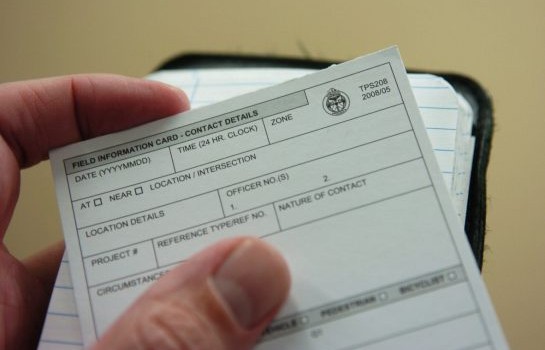
Published on March 31, 2014 | by Christina Balram Photography by JIM RANKIN / TORONTO STAR
0Hello, Officer
You’re walking down the street and you are stopped by a police officer that wants to have a conversation with you. Can you choose to walk away?
A new policy from the Toronto Police Services Board will aim to distinguish a line between police officers having a conversation with a person, and conversing with the intent of attaining the individual’s personal information. Or, as it is more commonly known, carding.
Simply put, carding is when an officer approaches a member of the public and engages them in a conversation. Shortly after, they input information about the person – usually displayed on government issued pieces of ID – into the police database. According to police, this is done to ensure that the public at large is safe by ensuring no one dangerous or with an outstanding criminal record is on the streets.
There are currently no defined policies in regards to the regulations surrounding carding.
The Chair of the Toronto Police Services Board, Alok Mukherjee said this new policy is long overdue.
“It’s an old issue and we have been doing things for a number of years and this policy is the next building block to make sure policing is clear from any bias.”
Though the policy is only in its drafting stage, it will aim to fill in the “grey area” when it comes to citizens knowing their rights when approached by an officer.
Lawyer Megan Savard, an associate of the lawyer who was hired to represent the police board, said people are not familiar with what they are allowed to do when approached by an officer.
“Depending on how the conversation goes, different people may say it has aspects of detention or they didn’t feel too comfortable or aware that they were allowed to leave.”
The board believes the new policy will resolve any confusion or miscommunication.
“In the policy we make a distinction between a conversation between police and a person as opposed to criminal investigation. There are clear requirements in the law of what actions to take if the police engage in a criminal investigation,” said Mukherjee.
One of the main difficulties with carding is helping people to feel safe when they talk to police, rather than feeling like they did something wrong.
“When approached by police, some extremists say it always feels like they are outnumbered by the officers, asked focused questions, and say the officers use terms like “we hear” or “hang on” which implies person is not free to go,” said Savard.
Some students believe the new laws will be beneficial for society because it will make them more aware of their rights in that situation.
“People will appreciate to know their rights. It will help people even though most have a general understanding of them,” said Patrick Kukulski, a second-year student at Humber College.
According to Savard, “If you are ever not sure about what your rights are when talking to the police, just ask.”
Mukherjee said the issue is highly debated since “the techniques used by police when deciding who they will start a conversation with have been debated, because it is presumed that the majority of the people are darker skinned.”
This is also one of the issues that the board hopes to address in the new policy.
“The issue of discriminatory (racial profiling) is an old issue. It has been around for many, many years and we have taken other measures as far as 2005 to deal with it,” said Mukherjee.
“Our fear is that if the public holds the view that policing is discriminatory and members of the community won’t have the confidence to interact with the police freely resulting in greater cooperation between the public and police,” added the chairman.
In an attempt to monitor police actions, the board is proposing two separate databases.
“The first is where information can be stored only when a supervisor decides it’s the right thing to do. The second is for all the information about all interactions, that is only the chief of police will be able to see,” said Mukherjee.
The “goal is to make police understand there is value in walking away – quality won’t depend on how many cards they get or how many ‘dates of births’ they get,” added Savard.
There will be a public meeting on April 8th, and once finalized, the policy could be in place as soon as May.




